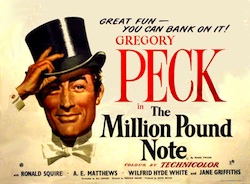Plot
In 1903, American seaman Henry Adams is stranded penniless in Britain and gets caught up in an unusual wager between two wealthy, eccentric brothers, Oliver and Roderick Montpelier. They persuade the Bank of England to issue a one million pound banknote, which they present to Adams in an envelope, only telling him that it contains some money. Oliver asserts that the mere existence of the note will enable the possessor to obtain whatever he needs, while Roderick insists that it would have to be spent for it to be of any use.
Once Adams gets over the shock of discovering how much the note is worth, he tries to return it to the brothers, but is told that they have left for a month. He then finds a letter in the envelope, explaining the wager and promising him a job if he can avoid spending the note for the month.
At first, everything goes as Oliver had predicted. Adams is mistaken for an eccentric millionaire and has no trouble getting food, clothes, and a hotel suite on credit, just by showing his note. The story of the note is reported in the newspapers. Adams is welcomed into exclusive social circles, meeting the American ambassador and English aristocracy. He becomes very friendly with Portia Lansdowne, the niece of the Duchess of Cromarty. Then fellow American Lloyd Hastings asks him to back a business venture. Hastings tells Adams that he does not have to put up any money himself; the mere association will allow Hastings to raise the money that he needs to develop his gold mine by selling shares.
Trouble arises when the Duke of Frognal, who had been unceremoniously evicted from the suite Adams now occupies, hides the note as a joke. When Adams is unable to produce the note, panic breaks out amongst the shareholders and Adams's creditors. All is straightened out in the end, and Adams is able to return the note to the Montpelier brothers at the end of the month. [3]
Production
The short story had previously been adapted for British TV in 1950.
Director Ronald Neame and producer John Bryan had just enjoyed a big success for Rank with The Card, a comedy based on a comic novel. They decided to film Mark Twain's short story and hired Jill Craigie to adapt it into a screenplay. John Davis of the Rank Organisation wanted a star to play the lead role, so Neame and Bryan approached Gregory Peck, who was then in France, seeing the woman he would marry. Peck wanted to stay in Europe, liked the screenplay and agreed to make the film. United Artists agreed to provide some finance, enabling the filmmakers to afford Peck's fee. [4] Peck agreed to make another film in England for Rank, The Purple Plain, as well as a film in Germany, Night People. Neame says Peck's fee was £75,000. [5] His signing was announced in April 1953. [6]
Neame wanted Dinah Sheridan to play the female lead but she had retired. "We were in desperate straights because he could not find a girl," he said. [5] Jane Griffiths was cast. [7]
Filming started May 1953. The majority of filming took place in Pinewood Studios where the sets were designed by John Box and Jack Maxsted. The director also made use of locations such as Belgrave Square. [8]
This page is based on this
Wikipedia article Text is available under the
CC BY-SA 4.0 license; additional terms may apply.
Images, videos and audio are available under their respective licenses.
